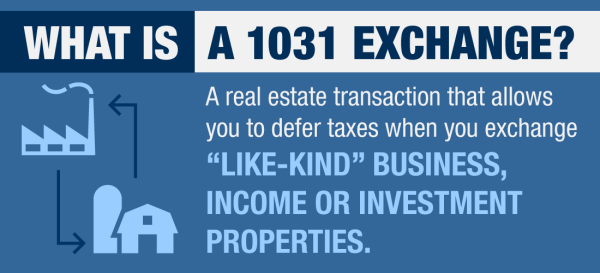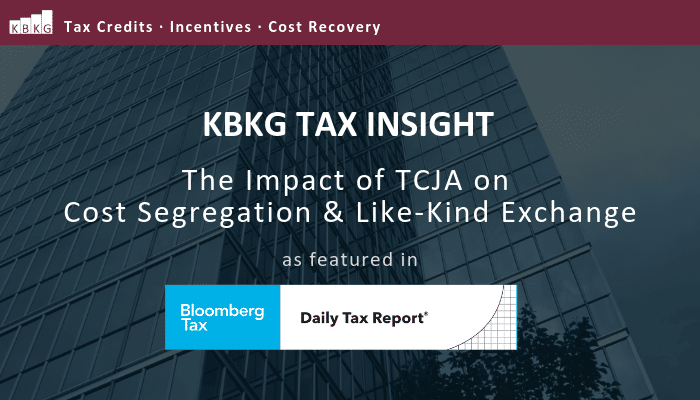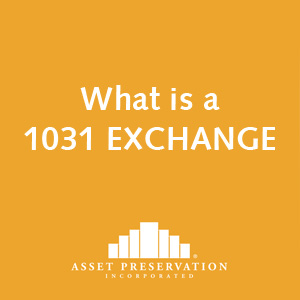tax deferred exchange definition
Under the Internal Revenue Code IRC real estate is classified as 1 trade or business property 2 investment property 3 inventory property or 4 personal residence property. When selling real estate sellers can face significant tax obligations from the profit of the property sold.

Are You Eligible For A 1031 Exchange
What Is A 1031 Tax Deferred Exchange.

. 1031 exchanges defer capital gains taxes. A tax-deferred exchange also referred to as a like-kind exchange a 1031 exchange a threeparty exchange or a Starker exchange may provide a way for you to take that 26000 apply it to the rental house purchase and delay the payment of the capital gains tax until you sell the new property. Its not tax free.
Although the numbers and the properties differ this is the type of question. Understanding a 1031 Tax Deferred Exchange. However by using the process of a 1031 Tax Deferred Exchange a property seller can shift their funds from the sold property to a new purchase or purchases.
Those taxes could run as high as 15 to 30 when state and federal taxes are combined. For example consider the traditional Individual Retirement Account IRAIf an investor places. An exchange will be partially taxable if the taxpayer receives net non-like kind property Boot in the exchange.
Because capital gains taxes can take a huge chunk of profits a 1031. This property exchange takes its name from Section 1031 of the Internal Revenue Code. Sometimes people say tax-free exchange but thats NOT accurate because the tax is only deferred until the day you sell the property and choose not to invest the money into a new one.
A section 1031 tax-deferred exchange is a way that real estate owners can sell investment real estate and buy a replacement piece or pieces of investment real estate while deferring both the capital gains tax as well as any depreciation recapture tax. The 1031 Exchange allows you to sell one or more appreciated rental or investment real estate or personal property relinquished property and defer the payment of your capital gain and depreciation recapture taxes by acquiring one or more like-kind properties. State federal and depreciation recapture taxes are deferred and the tax savings are invested in the new property.
A 1031 Exchange is the swap of qualified like-kind real estate for other qualified like-kind real estate structured pursuant to 1031 of the Internal Revenue Code. Standing in as the buyer when you buy transferring property back to you at the end And since you are distanced from the sale and purchase. Section 1031 of the US.
Deferred 1031 exchanges are. If the money touches your hands you get taxed. How Does Tax Deferred Work.
Tax-deferred status refers to investment earningssuch as interest dividends or capital gains that accumulate tax-free until the investor takes constructive receipt of the profits. Specifics of a Deferred 1031 Exchange. Tax code defines a 1031 exchange as a like-kind exchange of one investment property for another in which capital gains tax liability is deferred.
Standing in as the seller when you sell securing and holding your proceeds. Like-kind properties according to the IRS are properties of the same nature character or class. This keeps the entire series of actions as one transaction which makes it eligible for a 1031 exchange albeit a deferred one.
If you own investment property and are thinking about selling it and buying another property you should know about the 1031 tax-deferred exchange. If you receive cash relief from debt or property that is not like-kind however you may trigger some taxable gain in the year of the exchange. This is a procedure that allows the owner of investment property to sell it and buy like-kind property while deferring capital gains tax.
1031 real estate transactions are popular for the tax benefits they can provide. Section 1031 is tax-deferred but it is not tax-free. The exchange can include like-kind property exclusively or it can include like-kind property along with cash liabilities and property that are not like-kind.
The deferred 1031 exchange gives you time by allowing you to sell your first property to an intermediary who then buys the property on the other end of the exchange at a later date. On this page youll find a summary of the key points of the 1031 exchangerules concepts and. If you do not touch the money and instead reinvest it it will NOT get taxed.
The Internal Revenue Service IRS places a number of requirements on transactions to be considered a qualified Section 1031 tax-deferred exchange. In real estate a 1031 exchange is a swap of one investment property for another that allows capital gains taxes to be deferred. Section 1031 is a provision of the Internal Revenue Code IRC that allows a business or the owners of investment property to defer federal taxes on some exchanges of real estate.
There can be both deferred and. Exchanges may be fully tax-deferred or partially deferred and partially taxable depending on whether any Boot is received in the transaction. The termwhich gets its name from Internal Revenue Code IRC.
Not taxable until a future date or event as withdrawal or retirement. This post was co-authored with John Starling Senior Vice President Northern 1031 Exchange LLC. This is accomplished through a 1031 exchange intermediary also known as a tax-deferred exchange company who helps to ensure requirements and the.
The QI creates legal distance between you and your 1031 transactions by. Many private investors use this as a way to keep all of their equity active in real. Heres an easy way to remember this concept.
A 1031 Exchange is an exchange of like-kind properties that are held for business or investment purposes in the United States. Within a 1031 exchange funds are transferred from one propertys sale to another propertys purchase. The 1031 tax-deferred exchange is a method of temporarily avoiding capital gains taxes on the sale of an investment or business property.
1031 Exchanges are complex tax planning and wealth building strategies. Legal Definition of tax-deferred. Simply put you increase buying power while deferring taxes.
A tax-deferred exchange is a method by which a property owner trades one or more relinquished properties for one or more replacement properties of like-kind while deferring the payment of federal income taxes and some state taxes on the transaction. In the investment world tax deferred refers to investments on which applicable taxes typically income taxes and capital gains taxes are paid at a future date instead of in the period in which they are incurred. What is Tax Deferred.

What Is A 1031 Exchange Dst How Does It Work And What Are The Rules
1031 Exchange When Selling A Business
1031 Exchange When Selling A Business

International Vs Domestic Finance Project Finance Accounting And Finance Finance

6 Steps To Understanding 1031 Exchange Rules Stessa

Partial 1031 Exchange 1031 Exchange For Lesser Value Property

The Impact Of Tcja On Cost Segregation Like Kind Exchange

6 Steps To Understanding 1031 Exchange Rules Stessa

What Is Boot In A 1031 Exchange Youtube Exchange One Piece Episodes Carrie Anne Moss

What Is A 1031 Exchange Asset Preservation Inc

What Is A Starker Exchange 1031 Exchange Experts Equity Advantage

What Is A 1031 Tax Deferred Exchange Kiplinger
Like Kind Exchanges Of Real Property Journal Of Accountancy

Rules For Identification And Receipt Of Replacement Property Accruit

Hawaii Real Estate 1031 Exchange Buyers And Sellers Information
/bill-of-exchange-55bea739977f49c2897cd068b609b956.jpg)


